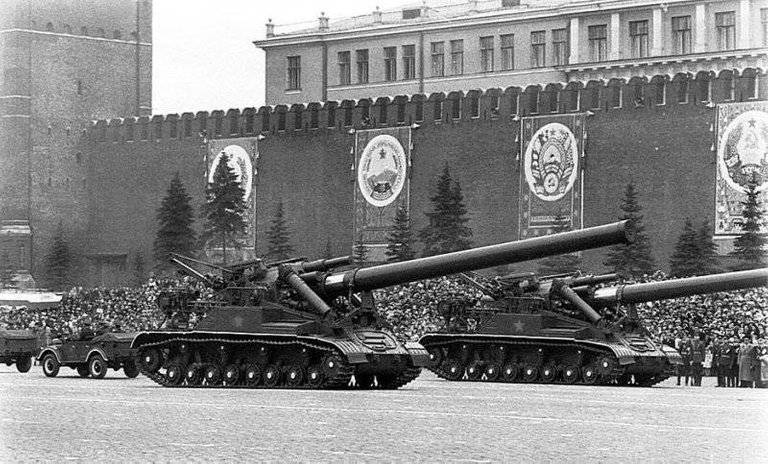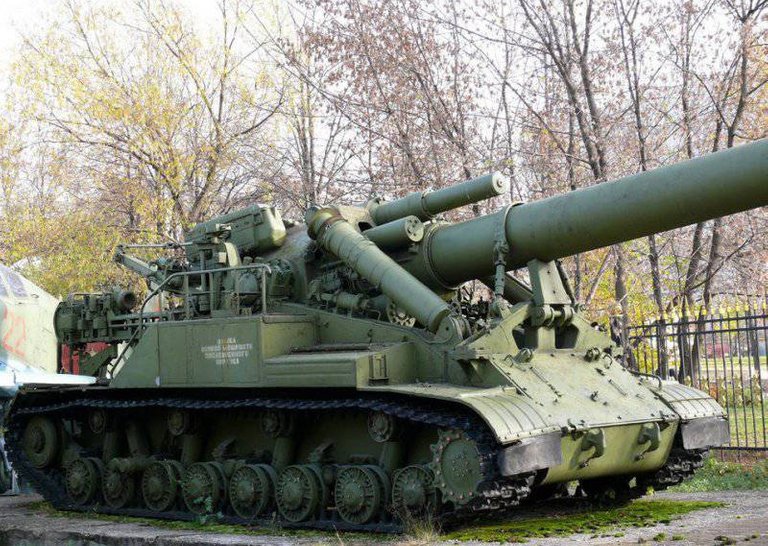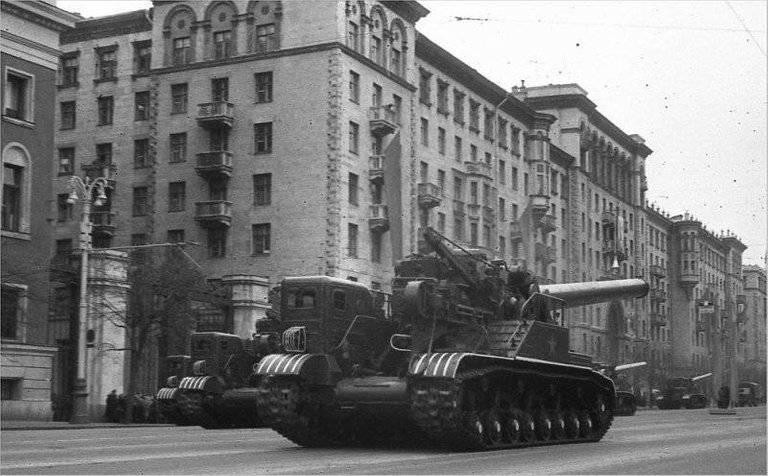
Self-propelled gun "Condenser-2P", index GRAU 2A3 - heavy self-propelled plant weighing 64 tons, capable of sending 570 kilogram shell at a range of 25.6 kilometers. Serially not produced, only 4 guns were made. The first self-propelled gun was shown at the parade on Red Square in 1957. The shown САУ has made furor among domestic spectators and foreign journalists. Some foreign experts have suggested that the cars shown during the parade were sham designed for the effect of intimidation, in reality it was a real 406-mm artillery system fired at a range.
To create a 406-mm self-propelled cannon of special power in the USSR began in 1954. This self-propelled gun was designed to destroy conventional and nuclear shells of large industrial and military targets of the enemy located at a distance of more than 25 kilometers. Just in case, the USSR began to develop three nuclear super-weapons: cannons, mortars and recoilless guns, caliber significantly exceeding the existing nuclear cannons. The chosen huge caliber arose as a result of the inability of Soviet nuclear scientists to produce a compact ammunition. In the course of development, in order to ensure the secrecy, the art system was given the designation "Condenser-2P" (object 271), already later the gun received its real index 2A3. The self-propelled gun was developed in parallel with 420-mm self-propelled mortar 2B1 "Oka" (object 273), according to the decision of the Council of Ministers of April 18, 1955.
Artillery part The self-propelled gun (the guidance and loading mechanism, the rocking part) was designed by TsKB-34 under the direction of II Ivanov, here it was assigned the CM-54 index. Horizontal gun guidance was carried out by turning the entire self-propelled gun, while precise guidance was carried out using a special electric motor through the rotation mechanism. The gun was guided vertically by hydraulic lifts, the projectile weight was 570 kg., The range of fire was 25.6 km.

Due to the fact that a suitable chassis for mounting such a large gun in the USSR was not, in the OKBT Leningrad plant them. Kirov for SAU 2A3 "Condenser-2P" on the basis of knots, parts, technical solutions of the running gear of the heavy tank T-10M (object 272), a new eight-kart chassis was created, which received the designation "object 271". In developing this chassis, the developers focused on the need to perceive a large recoil force when making a shot. The chassis developed by them had descending sloths and hydraulic shock absorbers, which were supposed to partially extinguish the recoil energy. The motor-power plant for this automatic control system was borrowed from the heavy tank T-10, practically not undergoing any changes.
In 1955, at the plant No. 221, work was completed on the development of a 406 mm experimental ballistic barrel SM-E124, at which the shots were fired to the CM-54 gun. In August of the same year the first fully manned artillery piece of the SM-54 gun was ready at the factory. Its installation on the chassis of the Kirov plant was completed on December 26, 1956. The tests of the SAU "Condenser-2P" passed from 1957 to 1959 at the Central Artillery Range near Leningrad, also known as the "Rzhev polygon". The tests were carried out jointly with the 420-mm self-propelled mortar 2B1 "Oka". Before carrying out these tests, many experts were skeptical about the fact that this self-propelled gun mount could survive the shot without destroying it. However, the 406-mm SAU 2A3 "Condenser-2P" has quite successfully passed the tests with mileage and shooting.
At the first stage of the test, the ACS was accompanied by numerous breakdowns. So, with the shot, the force of the CM-54 cannon, installed on the automatic control system, was such that the self-propelled gun on the caterpillar track rolled back several meters back. During the first shooting with the use of simulators of nuclear shells, the sloths were damaged at the ACS, which could not withstand the enormous forces of recoil of this weapon. In a number of other cases, cases have been noted with the breakdown of the equipment of the installation, a breakdown from the gearbox mountings.

After each shot, the engineers carefully studied the state of the material part, determined the weak parts and components of the structure, came up with new technical solutions for their elimination. As a result of such actions, the design of the automatic control system was continuously improved, the reliability of the installation was increased. The tests also revealed low maneuverability and patency of the automatic control system. At the same time, it was not possible to overcome all the shortcomings found. It was not possible to fully extinguish the return of the gun, when the gun was fired the gun moved back several meters. The angle of horizontal guidance was also insufficient. Due to their significant weight and size characteristics (weight about 64 tons, length along with the gun - 20 meters), preparation of the positions of SAU 2A3 "Condenser-2P" required a significant amount of time. The precise accuracy of the gun's firing required not only accurate guidance, but also careful preparation of the artillery position. To load the gun, special equipment was used, while charging was carried out only in a horizontal position.
A total of 4 copies of the 406 mm SAU "Condenser-2P" were produced, all of them were shown in 1957 during the parade on Red Square. Despite the skepticism of a number of foreign military men and journalists, the installation was militant, although it had a number of significant shortcomings. The mobility of the artillery system left much to be desired, it could not pass through the streets of small towns, under bridges, along country bridges, under power lines. According to the parameters and its range of fire, it could not compete with the tactical missile "Luna", so in the arsenal of the SAU 2A3 "Condenser-2P" did not arrive.
Source: https://topwar.ru/7071-samohodnaya-pushka-kondensator-2p-indeks-2a3-sssr.html